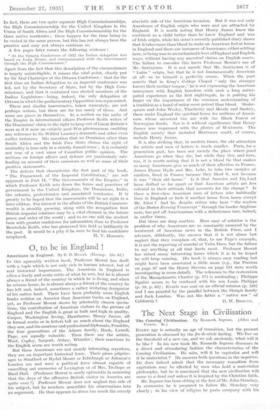0, to be in England !
Americans in England. By R. B. Mowat. (Harrap. 10s. 6d.) IN this agreeably written book, Professor Mowat has dealt with a topic which is not only rich in human interest, but of real historical importance. The American in England is often a lively and acute critic of what he sees, but he is almost always a friend of the country in which he is living, and when he returns home, he is almost always a friend of the country he has left and, indeed, sometimes a rather irritating denigrator of his native land. There have been 'probably more English' books written on America than American books on England, yet, as Professor Mowat shows by admirably chosen quota-, Cons, the contribution of American visitors to the picture of England and the English is great in bulk and high in quality. Cooper, Washington Irving, Hawthorne, Henry James, all in formal works or in letters tell us much about the England they saw, and the amateur and professional diplomats, Franklin, the four generations of the Adams family, Rush, Lowell, Page, are equally valuable. Then there are the artists, West, Copley, Sargent, Abbey, Whistler ; their reactions to the English scene are worth noting.
But these Americans are not merely interesting reporters, they are an important historical force: Their pious pilgrim- ages to Stratford or Rydal Mount or Edinburgh or Johnson's London are and were a political force almost capable of cancelling out memories of Lexington or of Mrs Trollope or Basil Hall: (Professor Mowat is surely optimistic in assuming that the days of the offensive British visitor to America are quite over ?) Professor Mowat does not neglect this side of his subject, but he nowhere assembles his obiervations into an argument. He thus appears to stress too much the merely
atavistic side of the American invasion. But it was not only Americans of English origin who were and are attracted by England. It is worth noting that Henry James knew the continent as a child better than he knew England and was of Irish origin, while his sister's recently published diary shows that it takes more than blood to make an American feel at home in England and there are instances of Americans, either settling here, or being won to an enthusiastic love ofEngland and English ways, without having any ancestral claims on English assets. The failure to consider this hurts Professor Mowat'S use of Mr. Santayana. It is not merely that Mr. Santayana is of " Latin " origin, but that he is not fundamentally American at all—as he himself is perfectly aware. When the poet asserts that in King's College Chapel "only the stranger knows their mother tongue," he is not expressing the American annoyance with English boredom with such a long antici- pated experience as the first nightingale, he is putting his finger on the importance of the common understanding of a tradition as a bond of union more potent than blood. Shake- speare and John Wesley, Thackeray and Moody and Sankey, these make England the spiritual home for millions of Ameri- cans whose ancestral ties are with the Black Forest or Norwegian fiords. Nor is it without significance that Henry James was impressed with the glories of Mcntmore. The English society that included Mentmore could, of course, include Henry James.
It is also striking that, in modern times, the old attraction for artists and men of letters is much smaller. Paris, for a generation past, has been not merely the place where good Americans go when they die, but while they live, and here, too, it is worth noting that it is not a blood tie that makes so many Americans give so much of their affection to France. James Hazen Hyde and Mrs. Lehr, to take two samples at random, lived in France because they liked it, not because it was "their old home." Is it that America and En1.1 ind have drifted so far apart or that American artists are less colonial in their attitude that accounts for the change ? Is there a first-class American man of letters who habitually fives in England or feels it another home from home except Mr. Eliot ? And he, despite critics who hear "the readers of the Boston Evening Transcript" througi I the louder Anglican note, has put off Americanism with a definiteness rare, indeed, in. earlier times.
But these are deep matters. More easy of solution is the problem of why Americans are so constantly annoyed by the treatment • of American news in the British Press, and I advance, diffidently, the answer that it is not abuse but neglect that they complain of, that, to use Page's example, it is not the reporting of scandal at Yuba Dam, but the failure to say anything at all that hurts most. Professor Mowat has raised many interesting hares which it is to be hoped he will keep running. His book is always easy reading but might have been annotated a little more (e.g., the Preston on page 97 and the Henry Stevens on page 181 were worth investigating in more detail). The reference to the restoration of the Massachusetts Charter (p. 17) is misleading ;. Philippe Egalite seems to be confused with his son Louis Philippe (p. 59, p. 62); Everts was sent on an official mission (p. 198) and I am. puzzled by the parallel between the Sturgis family and Jack London: Was not the latter a "native son " of


































 Previous page
Previous page